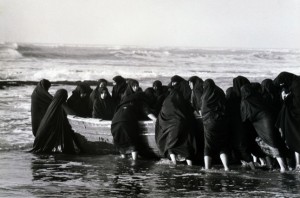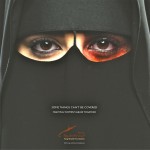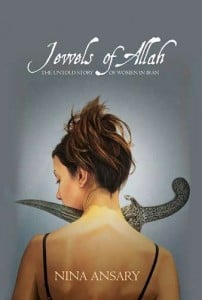When I was growing up in a small city on Canada’s East Coast, many of my classmates had no idea where Pakistan was located. It was the mid-eighties and I was unable to convince them I was NOT Indian just because both my parents were born in India. I decided to do an extensive geography project on my home country. I used pictures from my own travels and maps my father collected, and added a lot of details. I carefully drew flags, brought in mithai (Pakistani sweetmeats) and Nazia Hussain tapes, and dressed up in my shalwar kameez from Eid as I presented. I offered a few words to those who wanted to hear what “hello” and “I love you” sounded like in Urdu and Pashtu – only two of the dozens of dialects spoken in the country.
No one was interested. They all wanted to know about Iran. I was the only child in the class whose ancestry did not trace back to England, Ireland or Germany and so it was decided I could provide an insight into every exotic location on earth. Also, my name was Persian, something they already knew, and it was odd enough I was Pakistani with a Persian name of parents born in India. Obviously I could explain places like Iran and Cyprus.
The questions about “Eye-ran” came bombarding at me. My lovely fourth-grade teacher tried to direct the conversation back to Pakistan. “Iran is a completely different country” she firmly yet kindly explained to the wide-eyed class.They respectfully ignored her.
Their queries ranged from “Why did Iranian crazy people go and take American hostages?” and “My Dad says they eat dead lambs! *girls in the class gasp* That’s mean! Is that true?” to my favourite “Why do the women have to wear black blankets all the time? Your mother doesn’t wear a black one. She wears colours!” and so on and so forth.
Instead of ignoring the questions, I decided to defend Iran. I explained it was at war with Iraq for decades due to American interests. That Iran they had amazing wrestlers and poetry and women attended school. I declared that not everyone *wanted* to wear shorts all the time. And that I didn’t want to wear them. (Sidenote: That wasn’t entirely true when I was 9 years old but I added it for emphasis).
That’s all I could remember to say despite overhearing my father and his friends talk for hours about the 1979 Revolution, the deposed Shah and the usual Shia / Sunni discussions at community dinner parties.
I declared with finality “Americans are not so good all the time either. T.V. only reports what they think is true. Not what is true!” The class stopped.
How could I challenge Knowlton Nash and Peter Jennings? That was blasphemous. Madame wrapped up the party pretty quickly. She told me my project was wonderful and she thanked me.
I felt I wasn’t finished backing up Iran. I was fuming. Nine years old and fuming.
Twenty-six years later, I am still not finished defending Iran.
I am not a naive woman. I am aware of the multitude of human rights struggles, and stringent rules of policing of women’s clothes and public behaviours. There are journalists who are imprisoned for simply speaking out or who express opinions different than those of the current government. I know that there is multitude of other struggles that Iranian society must face.
There are events such as of public executions in sports stadiums, leading worlds’ sports organizations to warn Iran that public displays of executions on football pitches are unacceptable and may have consequences.
I have written on women being barred from attending football matches in sports stadiums in Iran and am aware of the subpar facilities they must use to train. There are tremendous issues of gender inequality and access.
However, I also see the theories of ignorant post Cold-War journalists simplifying the Iran hostage crisis and arguing that it created the concept of “Islamic Terrorism”. I’ve read the incessant stories (made into movies!!!) of oppression of white women who had encounters of misogyny and abuse like *all* Muslim women; Betty Mahmoody’s memoir Not Without My Daughter defined the treatment of Middle-Eastern women for so many in North America during the eighties. Covered Iranian and Muslim women were voiceless, powerless and oppressed by mean, angry men with accents and facial hair.
There are still the incessant critiques of Iranian woman, declaring in a reductive manner that the act of wearing hijab is always and unequivocally oppressive and at the behest of a government who considers women second class citizens. Often ignored are details of progress and advice on how to identify and resolve challenges from brilliant Iranian women such as Nobel Laureate, Shirin Ebadi.
I don’t expect Western media to embrace and applaud accomplishments of women in Iran. I do expect some responsibility and accuracy. In August 2012, there was frenzy in social media and mainstream media outlets as it was reported that the oh-so-sexist, Islamic republic had BANNED WOMEN FROM UNIVERSITIES. Well, not quite. Sadly even reputable social activists and journalists often use old information to propel anti-Iran sentiment.
Last week, I saw an old story being re-circulated by two prominent twitter personalities. (I have a following of 1000 tweeps so if I see someone with, let say, fifty thousand followers, I’ll classify them as “prominent”).
A Saudi-based, Columbia-trained journalist tweeted “Women to blame for earthquakes, says Iran cleric”. Wait! What!?!? Before I started to compose a rant about the idiocy of this cleric’s fatwa, I recalled hearing that before. I checked the story date: April 2010. Seriously? Can this guy not tweet about ANYTHING more recent? He’s tattletaling on Iran? From Saudi? *hijabdesk* I replied to him. He respectfully ignored me.
I had barely lifted my head off the desk when I saw it again from another social activist. Same story. Similar tweet. I replied to her immediately. She also ignored me, deleted her original tweet and then retweeted same thing … with more outrage.

Is it not possible to report on the successes and contributions of Iranian women in math, Science, photography, humanities, Journalism, film? The women who are questioning the status quo, who are demanding change — and have been even prior to being accused of causing shifts in tectonic plates.
There are intrepid women working, learning and fostering society in Iran. They are also fighting back.
But clearly, recycling old stories of ridiculous fatwas from Iranian old men or simply watching Argo is more appealing to the public when it comes to Iran. Continuing to present information that convinces us that Iran is backwards and draconian in all facets is better for media. Presenting women as insecure, downtrodden and weak is a much better plan.
With recent anti-Iran sentiment growing in the global sphere, one can’t help wonder if these are distractions planted to convince Westerners that Iran may really need to be rescued (read: decimated) by America and its trigger-happy allies.
Are we so shallow to not recognize that continuously peddling old material proving Iran has issues with misogynist practices (because no other country does…) is not helpful or relevant? Are we so convinced that clothing is *the* ultimate struggle for women — not safety, mobility, access to education, health and wellness care and freedom of choice in many matters?
Often I feel like a fourth-grader standing in front of a crowd. I still feel the need to defend Iran against ridiculous and malicious propagation of ideas.
My name is Persian, after all.












